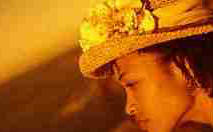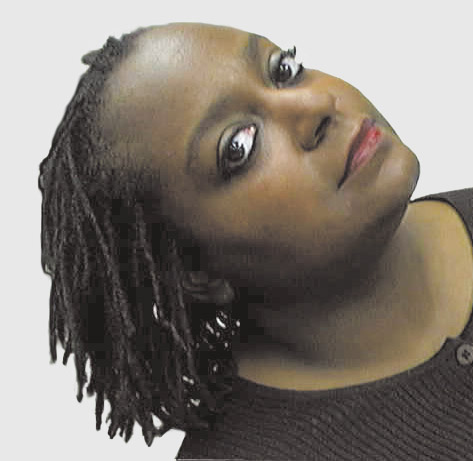














 
|
Who Is She?
 Kola
Boof Kola
Boof
Kola Boof calls herself a "Womanist" to honor
the woman who created that term, the legendary Alice Walker.
Kola also admits that she likes it when people compare her to
writers such as Walker and Toni Morrison, although she considers
herself to be a much different kind of artist than those women.
Kola says, "It will take some people years and years to
finally realize that I am an artist and that I have talent.
Because they are so resistant to my image and they are
prejudiced. But I am worthy and my name is Naima--the One who is
Victorious! I know that my work is important and a little ahead
of the times."
Kola Boof came to the United States after her
parents were murdered in Sudan. Her father, Egyptian
archeologist Atmu Bahari Kolbookek had spoken out against
Sudan's Islamic Arabic government, and especially, against
Sudan's practice of enslaving BLACK Africans. For this, he
and his wife were executed--leaving
Kola (whose real name is NAIMA KOLBOOKEK) an orphan.
Luckily, there was a Black American military family that wanted
to adopt "NAIMA", and although they were poor and already had
many children, they raised NAIMA, but suffered many trials and
tribulations because of the Sudanese child's refusal to lose her
African identity.
 Sudan's
Kola Boof (born Naima Alu Kolbookek) is slowly but surely
becoming the new black woman writer that "lots of people love
to hate". Remember back in the 70's and 80's when authors
like Alice Walker, Ntozake Shange, Gayl Jones and even Toni
Morrison were widely cursed and demonized for the skeletons they
exposed? Well now we have the strangely fabulous and daring Kola
Boof (she's a sexy feminist literary babe slash African warrior
girl slash historian) and she's already getting death threats by
the ton! Why is her work so confrontational? Sudan's
Kola Boof (born Naima Alu Kolbookek) is slowly but surely
becoming the new black woman writer that "lots of people love
to hate". Remember back in the 70's and 80's when authors
like Alice Walker, Ntozake Shange, Gayl Jones and even Toni
Morrison were widely cursed and demonized for the skeletons they
exposed? Well now we have the strangely fabulous and daring Kola
Boof (she's a sexy feminist literary babe slash African warrior
girl slash historian) and she's already getting death threats by
the ton! Why is her work so confrontational?
Miss Boof claims it's because she was adopted and raised by
Black Americans. She credits her teen years in the lower class
Anacostia Park section of Washington D.C. with giving her "the
nerve and skill of a hornet".
In her native Sudan, they recently told her that if she ever
tries to return, she will be killed on the spot (she called
Sudan's Arab government "Satanic" and wrote that Islam "is for
Pimps"). She pissed off numerous African-Americans by using the
'N' word repeatedly in her short story collection "LONG TRAIN
TO THE REDEEMING SIN", and she was roundly criticized by
South African officials after exposing colorism in their society
in the short story "DAY OF VOW"…add to that the rebuke of
Black Southern Christians for her story in which Jesus Christ
appears-as a very erotic Mexican. There's a decidedly sexual
freakiness to some of Kola's prose ala Anne Rice.
 "TOPLESS"
in America! "TOPLESS"
in America!
Ms. Boof states that her decision to be topless on the back of
her books has been the most painful source of criticism in her
life, both professionally and personally...IN HER OWN WORDS:
"I am topless to honor my mother and my grandmother. I am
topless to pay homage to all the centuries upon centuries of
AUTHENTIC African women who revered the bare breast just as
Christians revere the crucifix. It's no different than that, to
me. I am proud to be from those BLACK, topless spirit women who
created and sustained the natural world. But then there's
another reason."
"I prefer my own African image to a Eurocentric one, so being
topless is also a rebuke against the tragic image of Micheal
Jackson's white flesh--and it's my rejection of the image of Lil'
Kim's blond, blue-eyed insult. It hurts me that Black American
women have not supported me in my decision--I feel BETRAYED that
they haven't. But, of course, they are Americans and I notice
that most of the opinions that they have are the ones that
Europeans gave them. So I try to be understanding."
KOLA BOOF'S BLACK AMERICAN FAMILY
"I love my family very much", says Kola Boof by
telephone, (she speaks with a soft husky Garbo-like accent).
"They are my real blood in my mind. But we did not have it easy
getting along. Especially as I struggled to learn English and to
get used to my hair being straightened, which I deeply resented
for many years, but now I like it".
KOLA says that her biggest goal is to make a connection with
American Black Women and believes that African-Americans have a
special prejudice against Africans that makes it difficult for
her to be accepted. Nonetheless, her powerful and shocking
collection of short stories, "LONG TRAIN TO THE REDEEMING
SIN" is developing a growing fan base and Kola Boof's strong
feminist viewpoint is finally getting a look-see. Issues such as
colorism, female genital mutilation, authentic love and the
"sexual longing" of Black Women are what make Kola's work so
daring. Her famous poetry can be downright chilling--and her
next book, "DIARY OF A LOST GIRL" is already generating a
healthy buzz. "It's the college girls who really support me",
smiles Kola.
Ways to contact Kola
Boof:
kolaboof@yahoo.com or her Publisher at
or write to
Kola Boof
care of North African Book Exchange
424 West Commonwealth Ave. Suite 244
Fullerton, Calif. 92832.
The address in Morrocco is unavailable.
Related Links
Bint il Nil: Kola Boof's Best Poems
http://poetwomen.50megs.com
http://authors.aalbc.com/kola_boof.htm
|
|

|

"Long Train to the Redeeming Sin: Stories of African Women"
(ISBN: 0-9712019-2-7) is fast becoming a womanist CLASSIC in
Black Women's literature.
"I wanted to write about beautiful black
women", says Kola Boof. "Darskinned, lightskinned, fat,
skinny, happy, sad, strong and weak. I wanted to tell
fascinating stories of love, harmony and
history. I didn't expect the book to be so controversial."
"DIARY OF A LOST GIRL" (coming Jan. 2003) is the life
story of Kola Boof
and along with her memoirs, it features 5 brand new short
stories, 30 brand new poems and a host of powerful essays.
Read the exciting preview by senior editor Solomon Amadou!

KOLA BOOF:
MOTHERWIT, METEORS & MAGIC
Initially, I began writing this column as a book review for
Kola Boof. It became a platonic love letter for a dear friend.
Kola refers to us as “kindred spirits and warrior sisters”. Her
daring prose teaches me much that I never knew. And, she
documents much that I know too well...the global rage,
loneliness, and pain of being Black and female in a racist and
sexist world. --Alicia Banks
|
|

|